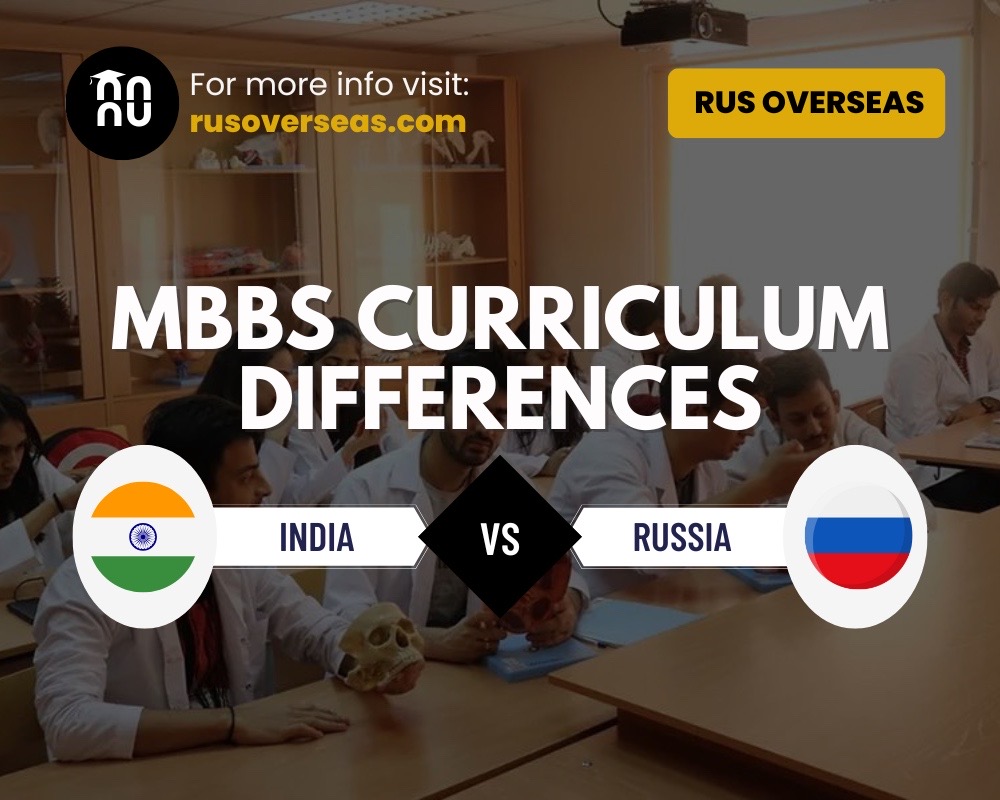Russian vs. Indian MBBS Curriculum Differences.

Okay, so you're deciding whether to do your MBBS in India or Russia, huh? It's a big choice! Both countries have a path to becoming a doctor, but the journey is very different. Think about it: both will take you to the top of the mountain, but one way might be steeper and rockier than the other. Here's how we dissect the most significant similarities and differences between MBBS courses in India and Russia to help you decide on which climb is for you:
Time is Money (and Education):
First off, the program length. In India, you're talking 5.5 years total. That includes an internship requirement to get some hands-on experience in an actual hospital setting. Russia stretches it a bit longer – typically 6 years with an internship. That extra six months can really be beneficial, giving you that much more time to burrow deeper into some subjects or specialties.
Structure: Compartments vs. Integration:
Think of the curriculum as a Lego set. In India, it's often more compartmentalized. You might study anatomy in one block, physiology in another, and so on. Russia is usually more of an integrated build. They try to put the various subjects together, exposing you to how they relate to each other right at the start. Imagine learning about the heart not just as a pump, but also how it's affected by different diseases and drugs at the same time.
Getting Your Hands Dirty: Clinical Exposure:
Clinical exposure is actually very important. It's great to learn about a disease, but it's not the same to see it for yourself. Both Indian and Russian programs have clinical rotations, but the ×amount× of hands-on activity can vary significantly. It is different in India based on which hospital is affiliated with your college. Bigger, busier hospitals = more opportunities. In Russia, the universities have very close affiliations with big hospitals, so you might be working with patient care and procedures sooner. But, like in India, the quality can also differ based on which hospital and the doctors who oversee you. So, research the affiliated hospitals, not only the university itself.
Hitting the Books: Theory vs. Practice:
Indian MBBS courses are heavily theory-driven and fact-based, especially in the first few years. Sometimes exams are a memory test. Russian medical studies require you to remember your facts, too, but they do attempt to correlate practical application more often. They want you to have the capacity to think and problem-solve, not just regurgitate facts.
Lost in Translation? The Language Barrier:
If you're not proficient in Russian, this will be a big one. While English is spoken at some of the Russian universities, language study will still be challenging. Imagine it's like trying to diagnose a patient when you have no idea what he's saying! This wouldn't typically be a problem in India, where English is widespread, but regional variation can still occur.
Show Me the Money: Cost and Accessibility
Cost is always an issue. Russian medical schools tend to be less expensive than Indian private medical colleges, so they're a popular option for foreign students. But don't forget to factor in the cost of living in Russia. Getting accepted to medical school is another issue. Getting into India's top colleges is absurdly competitive. Some Russian universities will have more relaxed admissions standards, but make sure they're accredited and well-respected. Don't jump at the first letter of acceptance!
Test Time: Exam Systems:
The way you’re tested also differs. India often relies on big, end-of-year exams that determine your fate. Russia tends to use continuous assessments throughout the year – practical exams, presentations, smaller tests. So, your grade is built up over time, and one bad exam doesn’t necessarily ruin everything.
What's Next? Specialization and Beyond:
Look at what happens when you graduate. Both countries allow for postgraduates, even though they receive your degree with differing recognition. A Russian MBBS may mean additional steps or licensing exams needed to practice within certain countries, such as where you live.
The Bottom Line:
There isn't one "best" here. It simply depends on your personality, learning style, cost, and professional aspirations. Indian MBBS has a tried system with strong roots, and Russia often offers sooner clinical exposure and an integrated system. Research, weigh the pros and cons, and follow what best suits you. Good luck!
SIMPLE ADMISSION PROCESS
No hefty donations, no entrance exams, no hassle for documentation just your dream MBBS study and you. RUS OVERSEAS does everything for you from scratch. We make sure you don’t have to do rounds of rotation and get fed up with the process of admission. From beginning to end, we are with you.
THE PROCESS
Eligibility:
- 50% in PCB (40% for SC/ST/OBC) in Class 12.
- Minimum 17 years by December 31 of the admission year.
- NEET Qualification: Mandatory for Indian students.
Invitation letter:
After RUS OVERSEAS submits your documents in the university. The university issues you an invitation letter.
Visa process:
Once the invitation letter arrives. The company will start your visa processing and in a few days you will be on the plane to Russia.
HOW RUS OVERSEAS HELPS YOU IN YOUR JOURNEY
RUS OVERSEAS has the experience of more than a decade. Our team is supportive and cares for the students wholeheartedly. We are available 24/7. Your one stop solution for MBBS abroad is us. We at RUS OVERSEAS will never disappoint any student or parent in their fulfilling journey with us.
CONTACT US
Phone: +91 9560533703
Email: info@rusoverseas.com
Rus Overseas provides expert assistance in choosing the right program, application processing, visa support, and settling in Russia. Contact us today to begin your abroad journey in Russia!
Sakib Hasan

